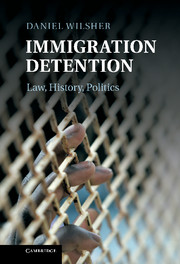Book contents
- Frontmatter
- Contents
- Acknowledgements
- Introduction and overview: free movement of persons and liberty of the person
- 1 The creation of immigration detention: from free movement to regulated borders in America and the United Kingdom
- 2 Modern immigration detention and the rise of the permanent bureaucratic enterprise
- 3 International law and immigration detention: between territorial sovereignty and emerging human rights norms
- 4 Negotiating detention within the European Union: redefining friends and enemies
- 5 Security and immigration detention: the problem of internment in peacetime
- 6 Global migration and the politics of immigration detention
- 7 Restoring the rule of law and influencing politics: placing boundaries around detention
- Bibliography
- Index
- References
7 - Restoring the rule of law and influencing politics: placing boundaries around detention
Published online by Cambridge University Press: 05 November 2011
- Frontmatter
- Contents
- Acknowledgements
- Introduction and overview: free movement of persons and liberty of the person
- 1 The creation of immigration detention: from free movement to regulated borders in America and the United Kingdom
- 2 Modern immigration detention and the rise of the permanent bureaucratic enterprise
- 3 International law and immigration detention: between territorial sovereignty and emerging human rights norms
- 4 Negotiating detention within the European Union: redefining friends and enemies
- 5 Security and immigration detention: the problem of internment in peacetime
- 6 Global migration and the politics of immigration detention
- 7 Restoring the rule of law and influencing politics: placing boundaries around detention
- Bibliography
- Index
- References
Summary
Introduction
Over one hundred years ago states began to assert a legal power to select amongst arriving immigrants prior to admission. Engaging the rights of friendly aliens to enter or remain was viewed as an aspect of the foreign relations power. This brief process first took place on ships or docksides, and involved care, as well as control. The conflict with the habeas corpus tradition could be papered over; these modest interferences with liberty were seen as ancillary to migration management. Longer detentions only occurred during discrete war or national security crises when the state's prerogative powers over defence again largely eclipsed the rule of law. Detention remained a relatively contained phenomenon for the most part.
Deeper consideration of the relationship between liberty of the person and restrictions on free movement has only come about in the last thirty years. As the politics of border control have become more inflamed, the scale and periods of detention have increased. Inland prisons and detention centres holding thousands have emerged. No longer simply a tool of selection at the border or for the expulsion of small numbers of dangerous persons, immigration powers have come to be employed to incarcerate ‘unauthorized’ aliens in unaccountable ways. Nor has this been confined to national security or emergency situations. Government practices have called into question the existence of a fundamental right to liberty for any unauthorized aliens. This is part of a wider political trend which seeks to deny entitlements to persons lacking immigration status, a trend presenting a fundamental threat to the post-war ideal of ‘universal’ human rights. Liberal legal systems have become compromised; to reaffirm the importance of individual liberty for all persons challenges the modern political tendency to portray unauthorized migrants as an ‘enemy’ to be segregated and repelled.
- Type
- Chapter
- Information
- Immigration DetentionLaw, History, Politics, pp. 310 - 354Publisher: Cambridge University PressPrint publication year: 2011



